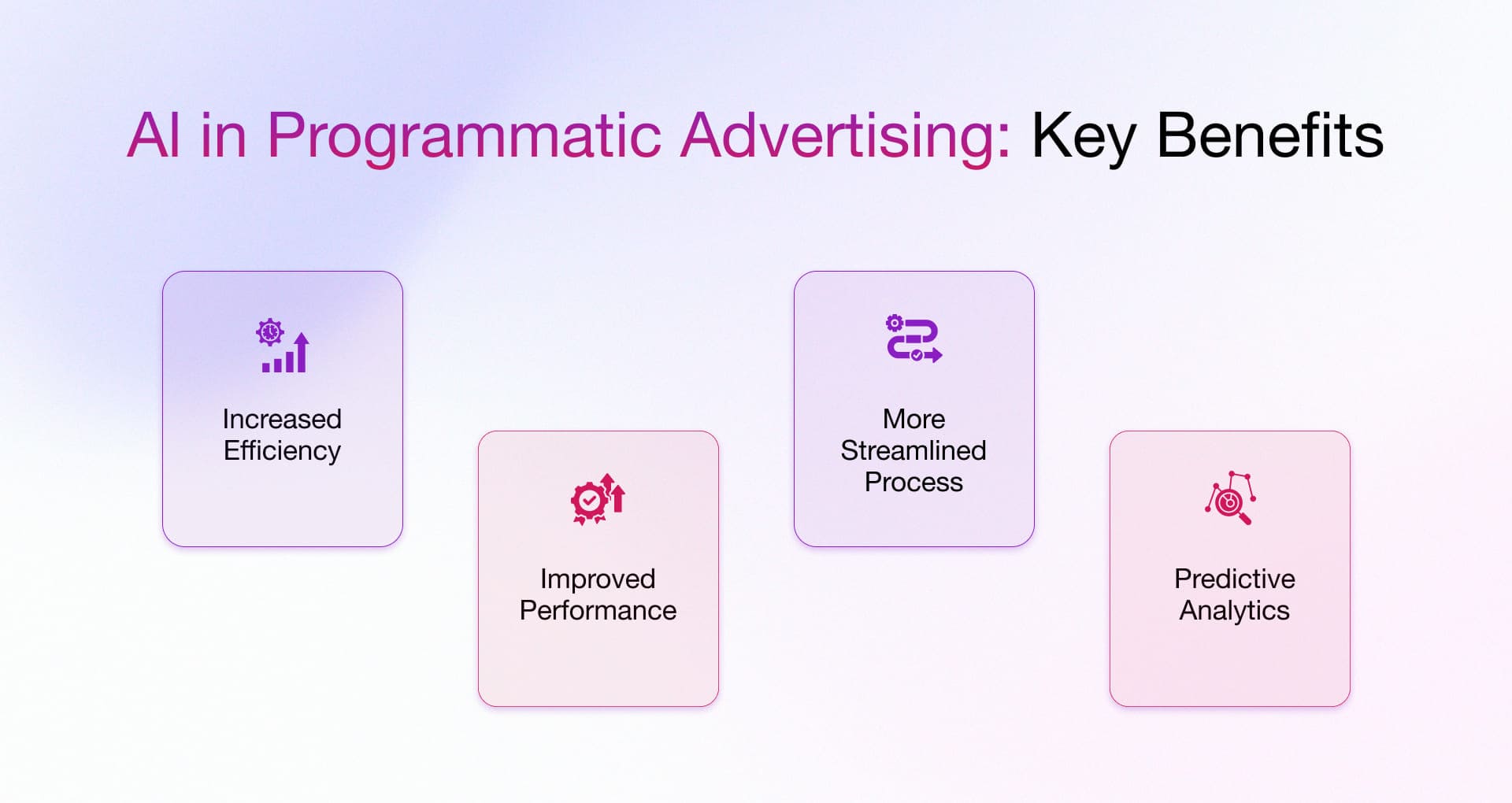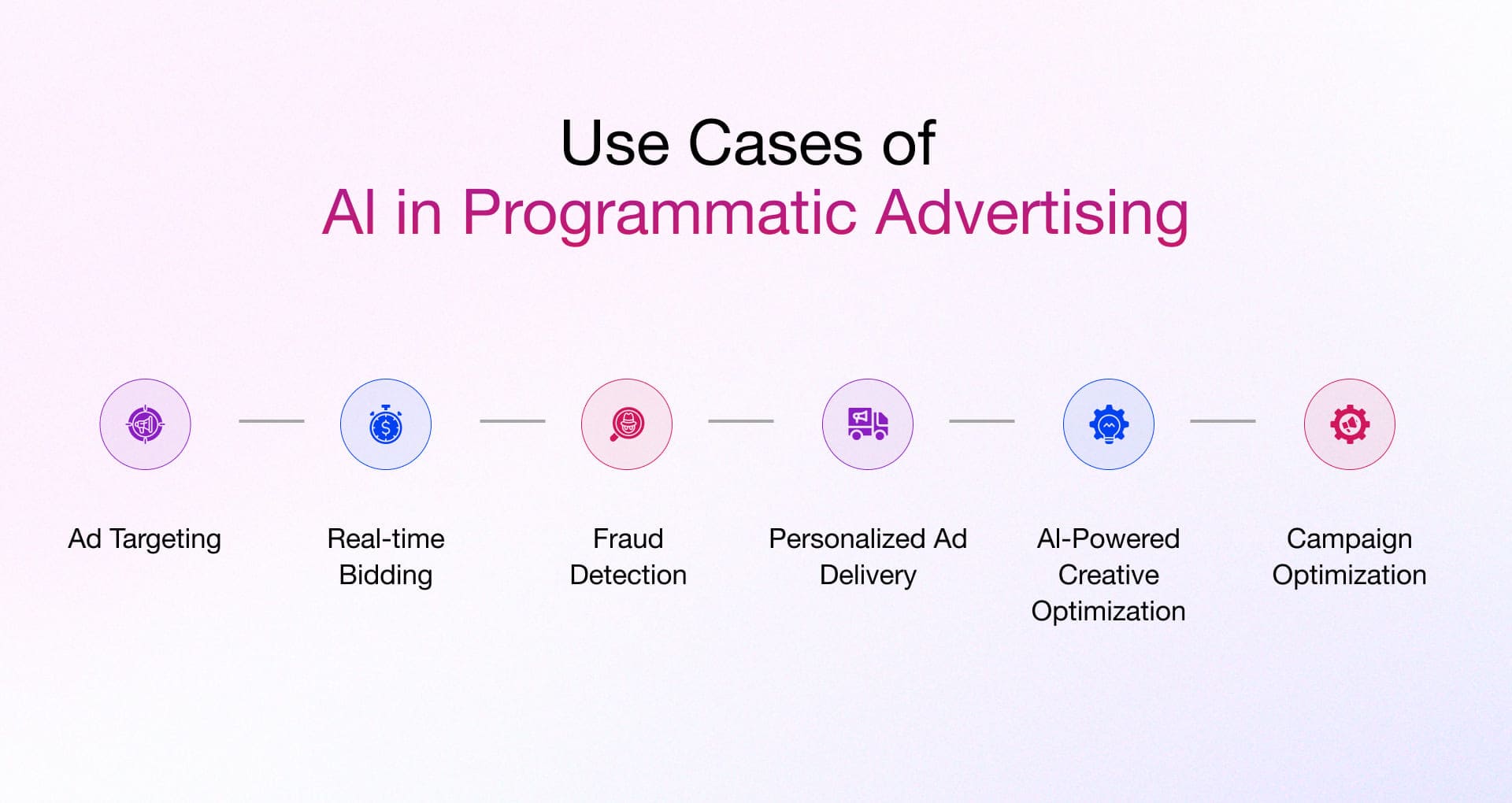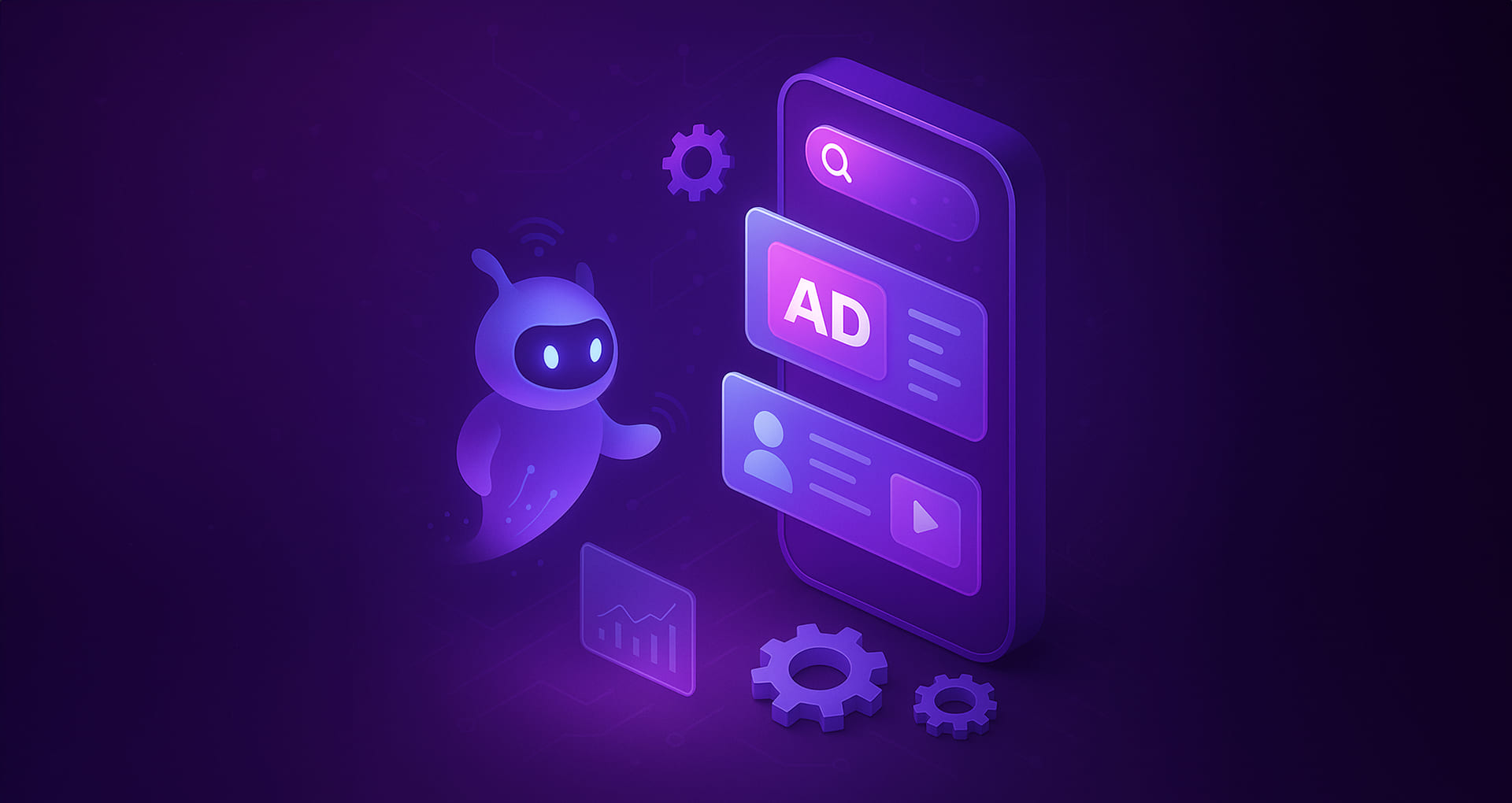The use of machine learning algorithms and AI in programmatic advertising enables them to learn and adjust their actions based on new patterns they encounter. The ability makes them extremely well-suited for the dynamic nature of programmatic advertising. These can also quickly process large amounts of data, which empowers them to make lightning-fast, data-driven decisions to optimize the performance of ad campaigns. This allows for highly targeted and personalized ad delivery, optimized bidding strategies, and continuous campaign improvement.
The integration of artificial intelligence and programmatic advertising empowers advertisers and publishers to redefine media buying & selling aspects. Recent research shows that 80% of programmatic advertisers are accelerating the use of AI. As a result, the AI market in programmatic advertising is projected to reach $38.7 billion by 2028, growing at a fast pace of nearly 30%[1] annually.
Are you actively looking to embrace the extended capabilities of AI in programmatic advertising? Continue reading this blog to discover the transformative power of AI, its benefits, use cases, and AI capabilities in various AdTech components.
Role of AI in Programmatic Advertising
Since the beginning of this decade, AI has always been a topic of discussion among tech-savvy ad tech leaders. However, the launch of ChatGPT and the increased significance of generative AI models has brought more attention to AI once again.
In the AdTech industry, the enhanced effectiveness of the programmatic advertising cycle and seamless, optimized, and automated media trading require the support of AI capabilities. Advertisers can now leverage AI in programmatic advertising especially for bidding and real-time ad campaign optimization, allowing them to focus more on targeting methodology, maximizing efficiency, and escalating return on ad spend (ROAS). Advanced advertising media are increasingly integrating AI to streamline campaigns, improve targeting, and optimize ad delivery to end users.
Artificial Intelligence, is facilitating more competent, intelligent, and streamlined programmatic advertising. It automates a range of vital functions in media transactions, including consumer insight discovery, media planning, and advertisement creative creation.
Benefits of AI in Programmatic Advertising
AI-powered programmatic advertising offers significant impact and outcomes such as audience-based segmentation, boosting the quality of ad creatives, real-time optimization, and campaign monitoring. Advertisers and publishers reap these key benefits through the intersection of AI and programmatic advertising.

Increased Efficiency: Advanced algorithms and machine learning models are trained to automate multiple facets of ad monetization, leading to better efficiency in ad planning, execution, management, and driving insightful results. Setting up campaigns with AI-based sophisticated approaches for target selection, strategic and optimal budget allocation, promotional messaging, performance report generation, and more in automation mode saves advertising agencies time and effort, allowing them to look after essential activities that impact the business’s bottom line.
Improved Performance: For the publisher’s benefit, custom AI solutions analyze past ad performance, users’ preferences and behaviors, and market trends to automatically set optimal prices for each impression, maximizing ad inventory revenue. Additionally, AI models evaluate the previous performance of ad networks and ad exchanges, to predict which among the listed ad options is the most valuable for generating better revenue.
For advertisers and agencies, AI offers targeting capabilities beyond basic demographics, boosting confidence in selling products, services, and solutions. AI-optimized supply-side platforms and demand-side platforms enhance ad performance through relevant targeting, leading to higher engagement and conversion rates.
More Streamlined Process: Automation and optimization are two core factors that AI brings to the table, effectively streamlining the entire workflow of ad placement transactions. AI in programmatic advertising enables more efficient coupling of ad inventory with the right targeted audience at the right time to maximize the value of impressions. It reduces the wastage of resources and inefficiency within the overall ecosystem. Integrating AI replaces the traditional manual approach with a seamless, data-driven ad-buying process. Auction-based selling facilitates faster transactions compared to manual negotiation and introduces the concept of dynamic pricing.
Predictive Analytics: AI’s predictive models are transforming programmatic advertising by offering advanced foresight into consumer behavior. Through vast data cluster analyses, AI models are trained to gain detailed insights into users’ actions beyond simple clicks, navigate complex purchase journeys, understand preferences, and identify major key events that impact users’ buying habits.
Top Use Cases of AI in Programmatic Advertising
AI adoption has the potential to unlock a trove of benefits for both sides of the programmatic advertising equation if its capabilities are utilized in the right manner. This section provides multiple use cases of how integrating AI in programmatic advertising makes it more refined and efficient.

Ad Targeting: Machine learning algorithms, particularly clustering algorithms, are used to analyze vast amounts of data about customer behavior, preferences, and past purchasing habits. Data and analytics services help in creating meaningful customer segments, which allows advertisers to target ads more effectively and show users relevant ads. AI-powered audience segmentation enhances campaign performance, reduces ad wastage through relevancy, and improves customer engagement. Another benefit of AI integration is the real-time refinement of targeted audiences beyond demographic targeting, ensuring that ads resonate more deeply with the targeted audience.
Real-time Bidding: ML algorithms evaluate various data points and variables in real time, which enables advertisers to make smarter bidding decisions and spend wisely. On the other side of the story, AI-powered RTB assists publishers in attracting the highest bids for their available ad inventory. It reduces the time of resources involved in traditional methods of ad placement, more accurate targeting, and maximizes the return on investment.
Fraud Detection: AI in programmatic advertising leverages machine learning algorithms that are trained on historical data to find anomalies such as a sudden spike in clicks from a single IP address or a higher click-through rate compared to standard benchmarks. AI can also be trained to recognize click fraud, impression fraud, and domain fraud. By blocking fraudulent activity, this transformative technology represents the campaign data based on true engagement. It also helps in avoiding blacklisting, which maintains a good reputation with ad networks and ad exchanges.
Personalized Ad Delivery: AI-powered analysis of customer preferences and behavior empowers hyper-personalized ad serving. It allows advertising agencies to create personalized experiences for every user, such as targeted ads, efficient product/service/solution recommendations, and personalized ad messages. Dynamic content creation increases user engagement, improves brand perception through positive user experiences, and helps achieve advertising goals more effectively.
AI-Powered Creative Optimization: As a versatile assistant, AI enhances the advertising team’s creativity by analyzing trending market topics, audience preferences, and effective content styles. By streamlining research and content creation, it empowers the team to concentrate on strategic endeavors, fostering improved efficiency in creative processes. This results in elevated content quality, improved relevancy, and increased diversity, ultimately boosting overall productivity and engagement. Businesses can further optimize these outcomes by leveraging AI development services tailored to their specific needs.
Campaign Optimization: Traditional campaign methods have taken a back seat as AI transforms programmatic advertising by bringing real-time intelligence to budget, bidding, and channel decisions. Tools like Google Performance Max, Meta’s Advantage+, and Adobe Sensei reposition campaigns by up front and aligning them with live performance data, bridging the disconnect and reigniting the next phase of automation. As metrics are on the rise, advertisers and publishers no longer need to be scrambling. They can move in the same direction as audience behavior and platform shifts.
Still, many advertisers don’t seem to understand the full power of AI or the right way to determine success. Overly focused on the metrics that matter only to them, they miss the chance to adopt smarter measurement models that reduce manual effort and improve ROI. As innovations like generative AI and predictive targeting evolve, AI continues to reshape how campaigns are run proving that relying on manual tactics alone is now worse than ever.
AI Capabilities in Different Components of Programmatic Advertising
These real-world applications of AI in programmatic advertising demonstrate how AI integration in various platforms of programmatic advertising boosts their power & multiplies their capabilities to make ad transactions.
Supply Side Platform: AI in SSP processes extensive data, which includes past ad performance, user auctions, and market trends. AI can predict which ad units will perform well at which time period, on different pages, and for the type of particular segment. Real-time optimization of floor prices ensures that publishers sell their ad inventory at the best possible rates. Machine learning models integrated into SSPs are built with capabilities to quickly identify high-value advertisers and ad networks in real-time, recommend direct deals, and boost premium inventory sales.
Demand Side Platform: AI in DSP enhances the media buying approach by offering optimized audience targeting, site/ad network platform selection, bid management, and uncomplicated budget allocation for improved ROI. Machine learning algorithms predict view-through conversions, and some DSPs utilize reinforcement learning, which is trained based on auction outcomes.
Real-time Bidding: RTB platforms in ad exchange marketplaces leverage AI models to intelligently analyze historical bidding data and predict future bids and user behavior more accurately. Publishers can set floor prices and select the optimal SSP partners. Additionally, AI assists advertisers in bidding smartly for valuable impressions, reducing wasteful spending, and detecting and avoiding fraud.
Data Management System: A DMS consists of a vast array of data in multiple forms and from various sources. AI incorporation in a data management platform for programmatic advertising helps in data cleansing to remove inconsistencies, link various data points to user devices, find insights from unstructured data, and forecast future trends and events.
Challenges in Leveraging AI in Programmatic Advertising and Tips to Navigate Them
AI has the potential to transform programmatic advertising, from powering smarter bidding to segmenting audiences, and generating dynamic creatives. As discussed earlier, it helps teams move faster and make sharper decisions. But many ad agencies are learning that bringing AI into the campaign stack is tougher than expected. Brands that are keen to spend ad dollars effectively must evaluate in context how they think analytically about their technology choices. This is the right time to invest in innovative ad solutions, accelerate strategic initiatives, and partner with an ad tech provider who can support long-term goals, because without clarity, no one gets too far.
The AI may be one of the powerful tools and taking ad landscape ahead of time, but they come with trade-offs. Privacy concerns, opaque algorithms, infrastructure constraints, and creative control challenges are now part of everyday conversations within media teams. To move ahead, advertisers must come up with high-level strategies that help them manage complexity while maintaining control. Let’s take a closer look at the most pressing challenges and how to address them with confidence.
1. Privacy Gets Complicated, Fast
Most of us in advertising have spent the last few years adjusting to a new data reality. Between GDPR, CPRA, and cookie deprecation, using audience data has become a lot trickier. And AI only adds more complexity it thrives on data. The better the data, the better the predictions. But the more personal the data, the more risk you carry.
Advertisers now face a balancing act: how do you keep performance strong without crossing any privacy lines? Leading teams are investing in clean rooms, shifting to first-party data strategies, and rethinking how consent is captured and respected. It’s not about doing more with less it’s about doing better with what you have.
2. The “Black Box” Problem Is Real
AI can be super useful, but let’s face it, it can also be puzzling. At times, it’s tough to figure out why a specific audience got top priority, or how a particular bid strategy worked out. You see the outcomes, but the reasoning behind them isn’t always obvious.
This lack of clarity makes it trickier for teams to fine-tune campaigns, break down results to clients, or even have faith in the system. That’s why more advertisers are calling for AI that explains itself tools and platforms that give you a peek into how choices are being made. You don’t need a PhD in machine learning just enough clarity to connect the dots between input and outcome.
3. Bias Can Sneak in Without Warning
Bias in AI isn’t always obvious but that doesn’t make it harmless. If your model is trained on incomplete or skewed data, you can end up excluding entire audience groups or reinforcing stereotypes without realizing it.
The industry has started taking this seriously. Some teams are running regular bias checks, auditing how audiences are built, and paying more attention to how training data is selected. Fairness isn’t just a compliance issue it’s a brand issue. And no one wants to explain why their campaign didn’t reach the audience it was meant for.
4. Automation Is Powerful But It’s Not Always Right
There’s a lot to love about AI handling the heavy lifting. Automated bidding, predictive targeting, dynamic creative it all sounds great on paper. But when things go wrong (and they sometimes do), it’s usually because no one was watching closely enough.
We’ve seen campaigns over-optimize for clicks while ignoring conversions. Or push the same message to everyone, regardless of where they are in the funnel. Automation without oversight can create more problems than it solves.
The best approach? Use AI to move faster, but keep humans in the loop. Creative teams, media strategists, and performance leads should all have visibility and veto power when needed.
5. Your Tech Stack Might Not Be Ready
Running real-time AI at scale takes infrastructure. If you think it’s just about having the right algorithm or the compute power to make decisions in milliseconds across thousands of impressions, then that’s not the whole picture.
For many advertisers, their existing systems aren’t built to handle the load. Latency, cost, and integration headaches slow everything down.
Cloud-native solutions and modular architecture are making things easier in this case. But upgrading your infrastructure is still a big step to count on, and one that requires coordination between advertising, IT, and data teams.
The Future of AI Programmatic Advertising
AI’s role in enhancing the impact of programmatic advertising is quite evident. In the future, beyond automation, AI will advance to create more intelligent, data-driven strategies. New capabilities like:
Advanced predictive analytics
In 2025, predictive analytics in programmatic advertising is powered by multimodal AI models like MindMem, which combine text, visuals, and audio to enhance ad performance and memorability. MindMem achieved a Spearman’s correlation of 0.731 in predicting ad recall and improved content retention by 74%, outperforming traditional models.
These AI systems go beyond click prediction, offering:
- Memorability forecasting
- Emotion-aware targeting
- Cross-channel optimization
- Creative quality scoring
Brands adopting multimodal analytics include:
- Coca-Cola: Boosted brand awareness by 33% using memory-driven video optimization.
- Nike: Increased CTV view-through rates 2.4x with AI-optimized audio/visual pairing.
- Unilever: Cut CPA by 27% using predictive creative scoring.
Platforms like Google DV360 are integrating such models into real-time bidding, enabling ads that aren’t just delivered—but remembered.
Hyper-personalized experiences
Modern AI frameworks like Agentic Multimodal AI (April 2025, arXiv) are redefining hyper-personalized advertising at scale. By combining multimodal inputs (text, image, audio) with retrieval-augmented generation (RAG) and persona-based models, they dynamically generate culturally relevant, adaptive ads.
Key features:
- Multilingual support for 20+ languages
- Persona conditioning for B2B/B2C relevance
- Real-time content generation using behavioral and contextual data
Starbucks delivers in-app offers based on user habits, weather, and time. Amazon uses voice and browsing data for real-time Alexa-based promotions.
These systems enable brands to shift from generic targeting to emotionally resonant, context-aware engagement at scale.
Cross-channel Automation
AI is reshaping how ads are planned, created, and delivered across platforms like social, video, display, and email.
Google (Marketing Live India 2025)
- AI Overviews with Ads: Search, Shopping, and Performance Max ads will now appear in generative search results in India.
- Automated Creatives: Tools like “Generated for You” turn product feeds into tailored ads across mobile, CTV, and social.
- Time-Optimized Delivery: AI schedules ads for best cross-screen performance.
Takeaway: Google’s AI tools enable smarter, real-time campaign execution.
Adobe (Adobe Summit 2025)
- 10 AI Agents + Orchestrator: Automate audience targeting, content creation, campaign testing, and optimization.
- Brand Concierge: Engages users across channels via voice, chat, and visuals.
- Cross-Channel Sync: Delivers multilingual, real-time campaigns with minimal manual input.
Takeaway: Adobe’s AI agents run end-to-end campaigns boosting personalization while cutting ad ops time.
Cookieless Contextual Targeting
In the post-cookie era, AI is enabling smarter, privacy-safe ad targeting using content context instead of user tracking.
Key Components:
- NLP: Understands page themes, tone, and sentiment beyond keywords.
- Visual Analysis: Identifies scenes, objects, and emotional cues in images/videos.
- Privacy Tech (PETs): Uses differential privacy and anonymized signals—no cookies required.
- Real-Time Sentiment Detection: Analyzes content mood instantly during the ad auction.
Real-World Example – Amazon’s Ad Relevance:
- Uses behavioral and contextual signals (no cookies)
- Results: 34% lower CPM, 8.8% better CPC, 65% reach on anonymous users
- Source: Marketing Dive
Emerging Tools (2025):
- Sentiment-aware targeting tools align ads with emotions like “celebration” or “intent to buy”
- Platforms like qa3
Generative AI for Creative Optimization
Generative AI is reshaping ad development, improving performance and reducing production time across channels. Here are the ways genAI is already making impact to ad industry:
- Auto-generates ad variations by audience
- Automatically builds personalized ad formats using product catalogs and creative assets.
- Used to quickly generate branded visuals and videos.
- Smart Ads generates on-brand creatives using performance data.
- Campaign Launcher deploys ads across Meta, Google, and TikTok.
Collaborate with Rishabh Software to Enhance Your Programmatic Advertising Strategy with Our AI Expertise
We are a leading AdTech software development services provider specializing in empowering the advertising industry with cutting-edge technological advancements to enhance programmatic advertising strategies. Our adtech team’s practice-proven experience in implementing AI in programmatic advertising ecosystem allows us to drive innovation in media trading, automate real-time ad transactions, and deliver hyper-personalized user experiences.
Our seasoned AdTech engineers excel in developing and customizing various AdTech solutions such as SSPs, DSPs, RTB platforms, ad exchanges, ad networks, and more to help you achieve enhanced targeting with omnichannel capabilities.
Frequently Asked Questions
Q: Who Benefits from AI in Programmatic Advertising?
A: All entities involved in programmatic advertising:
- Advertisers: AI optimizes the ad spend and helps in targeting the right audience which helps improve ROI. AI models process huge amounts of data to identify and target audience segments with personalized ads.
- Publishers: AI-powered programmatic platforms optimize ad placements which helps increase revenue from ad inventory. Data-driven contextual targeting ensures better user experience.
- Consumers: Personalized experience ensure they are served more relevant ad content that is useful to them. This results in fewer irrelevant ads and a more positive user experience.
- AdTech Companies: Integrating AI and programming advertising enables them to create new opportunities for growth and expansion and get a competitive advantage.
Footnotes:
1. https://www.sciencedirect.com/science/article/abs/pii/S0148296323004836








